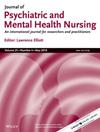Family resilience experiences of individuals with schizophrenia-family caregivers dyads: Qualitative study
Abstract
What is known on the subject?
- Family resilience is an important determinant of family caregivers' coping with difficulties of life and stress effectively.
- Family resilience factors contribute to the family's adaptation to difficulties. From the perspective of the individual living with schizophrenia and family, family resilience focuses not on the losses experienced but on the strengths.
What does this paper adds to existing knowledge?
- Many factors such as routines, positive cognitions, intra-family communication, family support and love as a healing force that contribute to family resilience were identified from the common perspective of the individual diagnosed with schizophrenia-family caregiver dyads.
- The climate of love within the family is an important strength both for the patient diagnosed with schizophrenia and for the family caregivers.
- Mutual support between family members, their listening to each other and sharing experiences with each other during this disease process are therapeutic for both parties and make them resilient.
What are the implications for practice?
- Family resilience factors should be considered in planning psychosocial interventions to be applied to individuals diagnosed with schizophrenia and family caregivers.
- The clinical use of psychosocial support interventions in family resilience which help both the individual diagnosed with schizophrenia and the family caregivers to gain a positive perspective, to improve their problem-solving skills, and to support each other within the family should be expanded.
- Displaying approaches aimed at increasing the climate of love and strengthening correct communication techniques within the family towards both the individual diagnosed with schizophrenia and the family caregiver should be supported.
- Psychiatric nurses' focusing on family resilience from a systemic perspective in chronic mental illnesses such as schizophrenia strengthens the patient and the family. This perspective focuses on functional dimensions and protects mental health despite existing problems.
Introduction
Family resilience is one of the important concepts that should be addressed in chronic mental illnesses.
Aim
This study was aimed at investigating family resilience experiences from the perspective of individuals diagnosed with schizophrenia-family caregiver dyads.
Method
The study was conducted in the Adult Psychiatry inpatient and outpatient unit of a university hospital in a province in western Turkey using the phenomenological method. By using the purposeful sampling method, 20 participants were selected in the study. Of them, 10 were family caregivers and 10 were patients diagnosed with schizophrenia. The results of the study were analysed with a dyadic approach within the framework of key processes of Walsh family resilience model. The directed content analysis method was used to analyse the data obtained from the study. COREQ checklist was used to report the research.
Results
After the analysis, the following five main themes emerged: positive cognitions, routines, family support, intra-family communication and love as a healing force.
Discussion
Family resilience is a structure shaped by the relationship between family members. The factors that contribute to the individual diagnosed with schizophrenia-caregiver dyads' ability to overcome difficulties in family resilience are discussed in line with the relevant literature.
Implications for Practice
Intervention programs should be implemented to create an environment of love by improving relationships and communication in the family, improving problem solving and increasing support resources.

 求助内容:
求助内容: 应助结果提醒方式:
应助结果提醒方式:


